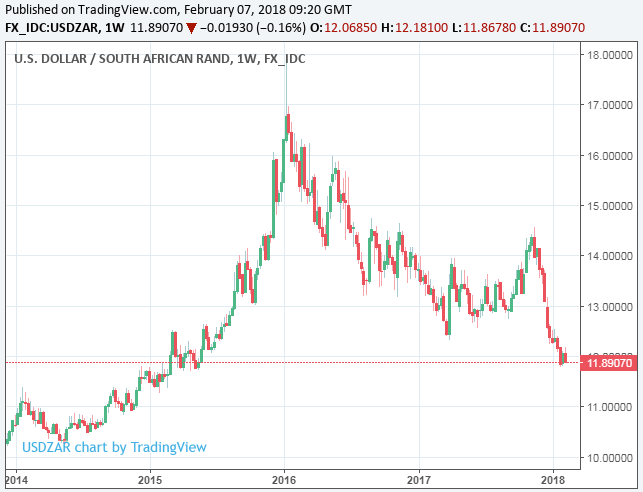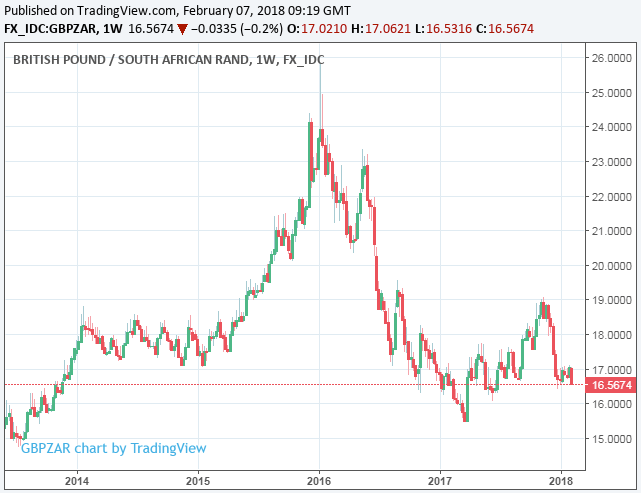South African Rand Headed Back to 3 Year Highs as “Zexit” Speculation Reaches Fever Pitch
- Written by: James Skinner

© kasto, Adobe Stock
"At present it looks as if the era Zuma was finally nearing its end, which would of course be good news for the rand," - Antje Praefcke, Commerzbank.
South Africa’s Rand traded higher across the board during the morning session in London Wednesday, as speculation over the supposedly imminent removal of President Jacob Zuma reached fever pitch.
Price action comes hard on the heels of South Africa’s parliament having postponed the annual State of the Nation (SONA) address, previously due on February 8, without setting another date for the speech to go ahead.
The suspension comes amid protests outside the African National Congress headquarters of Luthuli House, which saw violence flare when proponents and opponents of President Zuma clashed this week.
"At present it looks as if the era Zuma was finally nearing its end, which would of course be good news for the rand," says Antje Praefcke, an analyst at Commerzbank.
SONA’s suspension, and the protests, themselves came at the same time as the ANC’s national executive committee postponed an eagerly anticipated meeting, scheduled for this Wednesday, which will have seen party officials debate the removal of President Zuma.
The ANC said in a statement that the postponement is the result of constructive discussions between President Zuma and ANC party president Cyril Ramaphosa and that the special meeting will now be held on February 17. Discussions between President Zuma and his successor, Ramaphosa, are continuing.
“It remains hard to know exactly what is going on with the pressure on President Zuma to resign,” says John Cairns, a currency economist at Rand Merchant Bank.
“The postponement of the State of the Nation Address and the ANC NEC meeting that was planned for today has led the Business Day to speculate that President Zuma has agreed to step down, but one could just as easily read the news and come to the opposite conclusion. Meanwhile, beware of fake news.”

Above: USD/ZAR rate shown at weekly intervals.
The USD/ZAR rate was quoted 0.54% lower at 11.87 during early trading in London Wednesday while the Pound-to-Rand exchange rate was 0.58% lower at 16.56.

Above: Pound-to-Rand rate shown at weekly intervals.
Zuma Under Pressure, Credit Rating in Focus
President Jacob Zuma has been under pressure to resign and clear the decks for the reformist Cyril Ramaphosa to take the reins ahead of the budget statement due to be delivered on February 21.
With South Africa’s financial position under pressure, and the country in need of economic and political reform, Zuma’s departure is key to whether ratings agency Moody’s will give South Africa another free pass by holding off on a ratings downgrade this March.
“His removal must surely now mostly be in the price but we would still expect a knee-jerk reaction when it transpires,” says Cairns, speaking of the Rand.
South Africa’s Treasury must use its February 21 budget statement to set out a credible plan for reducing the budget deficit which, after topping 4% of GDP in 2017, threatens the country’s investment grade credit rating.
"Fiscal measures should be accompanied by growth-enhancing reforms to help debt consolidation. This would avert our base case of a downgrade of the local currency debt by Moody's," says Ferhan Salman, head of Turkey and South Africa Economics at Bank of America Merrill Lynch.
"Prior budgets fell short of delivering fiscal consolidation as they lacked structural reform."
The incumbent Zuma is seen as the least likely to push through sufficient enough reforms to bring down the deficit whereas the ANC’s new leader, Cyril Ramaphosa, has already shown an appetite for improving governance in South Africa.
A loss of investment grade status could be devastating as it would see many institutional investors forced into selling their government bonds. This would push South African borrowing costs higher and put downward pressure on the Rand once again as foreign investors flee the country.
"February will be volatile for SA assets. The potential for Zuma leaving office provides upside risks, while the February 21 budget and the looming Moody's local debt downgrade may trigger a sell-off," says Gabriele Foa, an emerging markets strategist at Bank of America Merrill Lynch.
"We think too much optimism has been priced into SA assets."
Advertisement
Get up to 5% more foreign exchange by using a specialist provider to get closer to the real market rate and avoid the gaping spreads charged by your bank when providing currency. Learn more here.
Severe Losses for the ZAR if Global Market Sell Off Resumes
After gaining some 14% over the last three months in a move that pushed the USD/ZAR rate near to a three year low, the Rand has begun to hand back some of its gains in recent days while strategists have warned of more volatility to come.
“So far, the rand, like other risk currencies, has held up well against the Wall Street drop. But this cannot continue: risk-aversion will eventually tumble all risk assets,” says RMB’s Cairns.
The warning comes after a severe sell off in global stock markets, which has since reversed. It was best witnessed through price action in both the S&P 500 and Japan’s NIKKEI indices Tuesday, which fell by more than 4% overnight and into the London Tuesday.
Such was the severity of the sell off that the CBOE VIX index, which measures volatility on the S&P 500 and is widely described as a “fear index”, rose more than 150% to 44.19 in a single session.
This marked the highest level for the VIX since early 2015 and took the index close to heights not seen since the very pinnacle of the Eurozone sovereign debt crisis.
“Real effects are also already being felt: foreigners sold R3.3bn of local bonds yesterday, and unless there is a sudden correction, the selling will almost certainly accelerate today,” Cairns adds.
“The bottom line is that rand volatility is set to explode and the risks are sharply skewed for aggressive rand weakness.”
The financial market tantrum has its roots in last Friday’s solid US jobs report, which saw markets panicking that the Federal Reserve may soon need to raise interest rates faster than previously thought.
Advertisement
Get up to 5% more foreign exchange by using a specialist provider to get closer to the real market rate and avoid the gaping spreads charged by your bank when providing currency. Learn more here.




